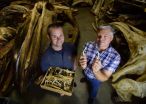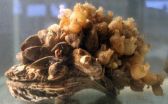(Press-News.org) Social networking programmes designed to help people lose weight could play a role in the global fight against obesity, according to research.
Analysis by researchers from Imperial College London combining the results of 12 previous studies shows that such programmes have achieved modest but significant results in helping participants lose weight.
The paper is one of 10 reports on global healthcare policy written for the World Innovation Summit for Health (WISH), an initiative of Qatar Foundation, and published today in the journal Health Affairs.
Obesity is an increasing issue in developed and developing countries, contributing to other diseases such as diabetes, cardiovascular disease, cancer and mental health problems and resulting in rising costs for health services.
The inaugural WISH Summit in 2013 convened world experts to discuss innovative ways to address major global health issues, including obesity. One innovation they considered is the use of social networking sites such as Twitter and Facebook to provide obese people with a community of support from both clinicians and peers to help them lose weight.
The researchers compiled data from 12 studies spread across the US, Europe, east Asia and Australia which trialled social networking services for weight loss, involving 1,884 participants in total. The amalgamated results showed that people who used these services achieved a collective decrease in body mass index by a value of 0.64, which the authors describe as modest but significant.
Health policy researcher and surgeon Dr Hutan Ashrafian, the lead author of the study at the Department of Surgery and Cancer, Imperial College London, said: "One advantage of using social media over other methods is that it offers the potential to be much more cost effective and practical for day-to-day use when compared to traditional approaches. The feeling of being part of a community allows patients to draw on the support of their peers as well as clinicians. They can get advice from their doctor without the inconvenience or cost of having to travel, and clinicians can provide advice to many patients simultaneously.
"There are also possible downsides, such as potential privacy issues and a need for the patient to be internet savvy, so it may not be right for everyone.
"The studies we looked at were the first to investigate social media approaches to obesity. There needs to be more research into this area to see what approaches work best for which patients in light of the dramatic global adoption of social media tools and content.
"The use of social media to treat obesity encourages patients to be more pro-active and empowers them to contribute towards their own treatment. It's not the only solution to the obesity epidemic, but it should be introduced as an element of every country's obesity strategy."
INFORMATION:
For more information please contact:
Sam Wong
Research Media Officer
Imperial College London
Email: sam.wong@imperial.ac.uk
Tel: +44(0)20 7594 2198
Out of hours duty press officer: +44(0)7803 886 248
Notes to editors:
1. H. Ashrafian et al. 'Social Networking Strategies That Aim To Reduce Obesity Have Achieved Significant Although Modest Results.' Health Affairs 33, No. 9 (2014) doi: 10.1377/hlthaff.2014.0370
After the embargo the paper will be available at: http://content.healthaffairs.org/content/33/9/1641.abstract
2. A briefing on this issue of Health Affairs will take place in Washington, DC on Monday 8 September 2014 from 9am to 12:30pm ET, with speakers including Professor Lord Ara Darzi Executive Chair, World Innovation Summit for Health, Qatar Foundation, and Director, Centre for Health Policy, Institute of Global Health Innovation, Imperial College London, the senior author of the report. A webcast of the briefing will be available at http://www.wish.org.qa/live-stream
3. About Imperial College London
Consistently rated amongst the world's best universities, Imperial College London is a science-based institution with a reputation for excellence in teaching and research that attracts 14,000 students and 6,000 staff of the highest international quality. Innovative research at the College explores the interface between science, medicine, engineering and business, delivering practical solutions that improve quality of life and the environment - underpinned by a dynamic enterprise culture.
Since its foundation in 1907, Imperial's contributions to society have included the discovery of penicillin, the development of holography and the foundations of fibre optics. This commitment to the application of research for the benefit of all continues today, with current focuses including interdisciplinary collaborations to improve global health, tackle climate change, develop sustainable sources of energy and address security challenges.
In 2007, Imperial College London and Imperial College Healthcare NHS Trust formed the UK's first Academic Health Science Centre. This unique partnership aims to improve the quality of life of patients and populations by taking new discoveries and translating them into new therapies as quickly as possible.
http://www.imperial.ac.uk
4. About the World Innovation Summit for Health:
The World Innovation Summit for Health (WISH) is a global healthcare community dedicated to capturing and disseminating the best evidence-based ideas and practices. WISH is an initiative of Qatar Foundation for Education, Science and Community Development (QF) and is under the patronage of Her Highness Sheikha Moza bint Nasser, its Chairperson.
The inaugural WISH Summit took place in Doha in 2013 and convened more than 1,000 global healthcare leaders. Through annual Summits and a range of ongoing initiatives, WISH is creating a global community of leading innovators in healthcare policy, research and industry.
Together, they are harnessing the power of innovation to overcome the world's most urgent healthcare challenges and inspire other stakeholders to action.
Social networking can help people lose weight
2014-09-08
ELSE PRESS RELEASES FROM THIS DATE:
Scientists take a look at the feel-good benefits of belly dance
2014-09-08
Belly dancers have fewer hang-ups about their bodies. Most women who participate in this torso-driven dance do so because it is fun and they get to perform interesting moves – not because they necessarily feel sexier while doing so. This is the conclusion of Marika Tiggemann of Flinders University in Australia, leader of a study in Springer's journal Sex Roles about the body image of people who belly dance in their free time.
Body image is the way in which someone perceives, feels and thinks about his or her body, especially factors regarding shape and weight. Previous ...
New research shows that there could be increased numbers of psychopaths in senior managerial positions and high levels of business
2014-09-08
A BREAKTHROUGH by a talented University of Huddersfield student has shown for the first time that people with psychopathic tendencies who have high IQs can mask their symptoms by manipulating tests designed to reveal their personalities. It raises the possibility that large numbers of ruthless risk-takers are able to conceal their level of psychopathy as they rise to key managerial posts.
Carolyn Bate, aged 22, was still an undergraduate when she carried out her groundbreaking research into the links between psychopathy and intelligence, using a range of special tests ...
NRL scientist explores birth of a planet
2014-09-08
Dr. John Carr, a scientist at the U.S. Naval Research Laboratory, is part of an international team that has discovered what they believe is evidence of a planet forming around a star about 335 light years from Earth. This research is published in the August 20th issue of The Astrophysical Journal.
Carr and the other research team members set out to study the protoplanetary disk around a star known as HD 100546, and as sometimes happens in scientific inquiry, it was by "chance" that they stumbled upon the formation of the planet orbiting this star. A protoplanetary disk, ...
Novel cancer drug proves safe for leukemia patients
2014-09-08
WINSTON-SALEM, N.C. – Sept. 8, 2014 – Results of a Phase I clinical trial showed that a new drug targeting mitochondrial function in human cancer cells was safe and showed some efficacy. The findings, reported by doctors at Wake Forest Baptist Medical Center, are published in the current online edition of the journal Clinical Cancer Research.
"This drug is selectively taken up by cancer cells and then shuts down the production of energy in the mitochondria," said Timothy Pardee, M.D., Ph.D., director of leukemia translational research at Wake Forest Baptist and principal ...
New genomic editing methods produce better disease models from patient-derived iPSCs
2014-09-08
New Rochelle, NY, September 8, 2014—Highly valuable for modeling human diseases and discovering novel drugs and cell-based therapies, induced pluripotent stem cells (iPSCs) are created by reprogramming an adult cell from a patient to obtain patient-specific stem cells. Due to genetic variation, however, iPSCs may differ from a patient's diseased cells, and researchers are now applying new and emerging genomic editing tools to human disease modeling, as described in a comprehensive Review article published in Stem Cells and Development, a peer-reviewed journal from Mary ...
Living in the shadow of Mauna Loa: A silent summit belies a volcano's forgotten fury
2014-09-08
Alexandria, Va. — Earth's largest active volcano, Mauna Loa on Hawaii's Big Island, is taking a nap. And after 30 years, no one is sure when the sleeping giant will awaken. Scientists say it's likely to erupt again within the next couple of decades and, when it does, it will be spectacular — and potentially dangerous.
Although Mauna Loa often takes a back seat to the more famous Kilauea, which has been erupting nearly continuously since 1983, history warns us that Mauna Loa's current silence is anomalous. Meanwhile, more people and more buildings pack into potentially ...
Whale sex: It's all in the hips
2014-09-08
Both whales and dolphins have pelvic (hip) bones, evolutionary remnants from when their ancestors walked on land more than 40 million years ago. Common wisdom has long held that those bones are simply vestigial, slowly withering away like tailbones on humans.
New research from USC and the Natural History Museum of Los Angeles County (NHM) flies directly in the face of that assumption, finding that not only do those pelvic bones serve a purpose – but their size and possibly shape are influenced by the forces of sexual selection.
"Everyone's always assumed that if you ...
Study puts some mussels into Bay restoration
2014-09-08
Restoring oysters—and their ability to filter large volumes of water—is widely seen as a key way to improve the health of Chesapeake Bay. New research makes this calculus even more appealing, showing that the mussels that typically colonize the nooks and crannies of a restored oyster reef can more than double its overall filtration capacity.
The study—by researchers at the University of Maryland, the Smithsonian Environmental Research Center, and the Virginia Institute of Marine Science—appears as the cover story in the most recent issue of Restoration Ecology.
"Many ...
New targets for treating pulmonary hypertension found
2014-09-08
Two new potential therapeutic targets for the treatment of pulmonary arterial hypertension, a deadly disease marked by high blood pressure in the lungs, have been identified by researchers at the University of Illinois at Chicago. Their findings are reported in the American Journal of Respiratory and Critical Care Medicine.
Early symptoms of pulmonary arterial hypertension include shortness of breath and exercise intolerance. As the disease progresses, patients may require oxygen supplementation and lung transplantation. Heart failure can develop and is a major cause of ...
New compound inhibits enzyme crucial to MERS and SARS viruses, with a catch
2014-09-08
Scientists at the University of Illinois, Chicago, have identified a compound that effectively inhibits an enzyme crucial to the viruses that cause Middle East respiratory syndrome (MERS) and severe acute respiratory syndrome (SARS). The compound appears to have a different method of inhibition in each virus due to slight differences in each virus' enzyme which means finding other compounds that inhibit both may be difficult according to research presented at the 54th Interscience Conference on Antimicrobial Agents and Chemotherapy (ICAAC) an infectious disease meeting ...




